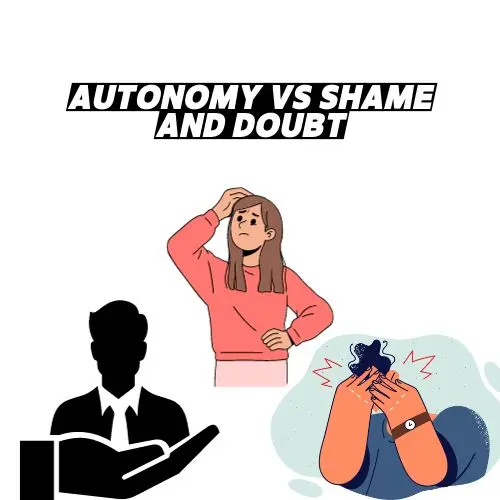Introduction
Autonomy and shame/doubt represent two critical stages in a child’s psychosocial development, according to renowned psychologist Erik Erikson. Successfully navigating these stages leads to positive outcomes, while failure can result in maladjustment later in life.
Key Differences Between Autonomy and Shame/Doubt
| Autonomy | Shame and Doubt |
|---|---|
| Age range | 18 months – 3 years |
| Key question | “Can I do things myself?” |
| Virtue gained | Willpower, self-control |
| Positive outcome | Sense of independence, confidence |
| Negative outcome | Shame, doubt |
Autonomy refers to a toddler’s desire to master physical skills and exert independence. Shame and doubt occur in the preschool years as children become more aware of societal rules and expectations. Success leads to freedom; failure causes them to feel ashamed.
What Is Autonomy?

Autonomy is the second stage in Erikson’s model of psychosocial development. It occurs between 18 months and 3 years old. During this “toddler” stage, children gain control over their bodies and environments.
The key question of this stage is “Can I do things myself?” Toddlers experience a sense of autonomy and independence as they master new physical skills like walking, climbing, controlling bowels/bladder, and using their hands purposefully.
Autonomy involves:
- Greater physical abilities and mobility
- Asserting one’s willpower and sense of self
- Exploring surroundings
- Performing self-care tasks independently
Toddlers have an inherent drive to become “doers” who can take care of themselves. Erikson called this the “holding on” versus “letting go” crisis. Children cling to their parents while also wanting freedom.
If toddlers are restricted too much, they may become compulsive, defiant and regress. But with enough support, they gain self-esteem, confidence and a sense of independence. Willpower and self-control result from balancing autonomy with healthy limits.
Autonomy vs Shame & Doubt Examples
- Positive autonomy: A 2-year-old insists on feeding himself and wants to walk instead of riding in the stroller. His parents let him develop self-care skills on his timeline.
- Negative outcome: Parents who are overly protective or frequently do things for a child well within her ability prevent the development of independence. She may become clingy and lack self-esteem.
- Positive outcome: Allowing a toddler freedom to explore within safe limits helps him gain confidence in his physical abilities. He beams with pride at mastering a new task, “All by myself!”
The autonomic stage lays the groundwork for future independence and builds self-esteem.
What Is Shame and Doubt?

After the autonomy stage comes shame and doubt from around 3 to 6 years old. This corresponds to the preschool years.
The key question now facing children is, “Is it okay to do things my own way?” As preschoolers interact more with other children and adults, they must internalize societal rules and expectations.
Shame and doubt involve:
- Learning right from wrong
- Conforming to social norms
- Acquiring skills valued by society
- A sense of inadequacy or guilt over failing
Children now compare themselves to others as their social world expands beyond their parents. They may feel shame and doubt when their desires clash with rules or expectations.
However, preschoolers can also take pride in developing new skills and self-control. Finding the balance between unbridled independence and over-conformity leads to competence and self-esteem.
Shame & Doubt vs Autonomy Examples
- Positive outcome: A 4-year-old uses the potty consistently and can dress himself. He gains confidence by mastering the expected skills.
- Negative outcome: A preschooler is abruptly forced to wean from breastfeeding before she is ready. She feels intense shame over this loss of autonomy.
- Positive autonomy: Parents allow a 3-year-old to choose her clothes but require clean-up after playtime. She accepts some control over her environment.
- Negative shame: Harsh potty training causes a toddler to feel guilt and inadequacy when accidents inevitably happen.
While autonomy comes from within, shame is imposed externally through punishment, disapproval, or rejection. Skilled parenting can minimize shame and build competence.
Why Are These Stages Important?

According to Erikson, successfully completing each developmental milestone results in a corresponding virtue:
- Autonomy leads to willpower and self-control.
- Shame and doubt, when positively resolved, result in competence and skill mastery.
These virtues provide a foundation for future emotional, social, and cognitive growth. Children who emerge from these stages with an intact sense of self-esteem are equipped to face subsequent challenges.
Conversely, children who do not get adequate support during these times may fail to gain a sense of independence or adequacy. Lingering shame and doubt hinder exploration and skill acquisition.
Later stages build on autonomy, shame, and doubt. Identity exploration in the teen years requires willpower and competence gained as a toddler and preschooler.
Research affirms the life-long impact of early autonomy support. For example, toddlers are allowed to explore and develop greater cognitive, emotional and social skills than older children. Preschool teacher warmth and acceptance predict academic and behavioural outcomes years later.
Parenting Tips for Promoting Autonomy and Competence

Parents play a critical role in helping children navigate autonomy and shame/doubt successfully:
For autonomy:
- Allow children to do things at their own pace
- Be patient as they learn self-care skills
- Provide toys and environments that enable independence
- Give choices when appropriate
- Set gentle but firm limits on safety issues
For shame and doubt:
- Use praise and positive reinforcement
- Avoid harsh punishments or belittling
- Be warm, accepting, and responsive
- Give guidance and support for new skills
- Allow mistakes as part of learning
- Focus discipline on actions, not character
Parents who strike the right balance between freedom and limits set their children up for emotional security and success. Respecting a child’s stage-appropriate needs for both autonomy and support minimizes shame and builds competence.
Conclusion
Erikson’s model highlights autonomy and shame/doubt as critical in a child’s development of independence, willpower, pride and skill mastery. Successful navigation of these stages leads to positive outcomes later in life. Parents play an essential role through supportive, responsive parenting that encourages autonomy within safe limits and avoids shaming discipline. Understanding these fundamental developmental needs can help all parents raise children who are confident, resilient and equipped for future challenges.
Read Also: Positive Affirmations For Social Anxiety


1 thought on “Autonomy vs Shame and Doubt: A Developmental Milestone”